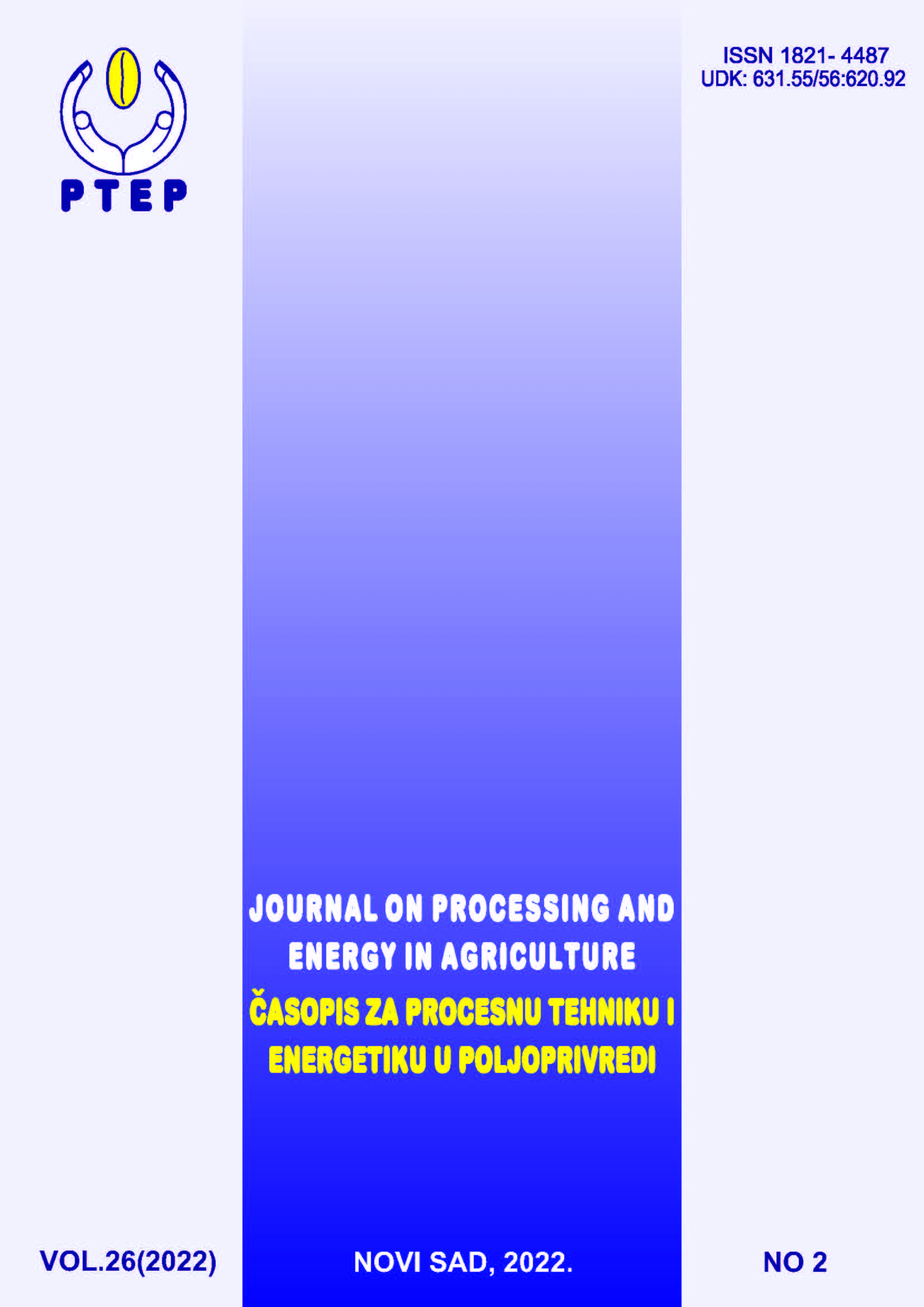JOINT AND DIRECT EFFECTS OF GENOTYPES AND ENVIRONMENT CONDITIONS ON YIELD OF HYBRID MAIZE SEED
Abstract
This study aimed to evaluate the influence of environmental conditions and genotype on the yield of three maize lines and the morphological properties of cobs and seeds. Three hybrid maize lines were used as material in the study, two years (2019-2018) and one location (Zemun Polje). The following parameters were monitored: 1000-seed weight, seed volume, bulk density, cob length, cob thickness, fraction content and grain yield. The average grain yield for all three lines in the first and the second year was 6.13 t ha-1 and 4.66 t ha-1, respectively. A significant impact of environment was noticed on 1000 seed weights in both years (2018 and 2019), 327.56 g and 251.77 g, respectively. In 2018 proportion of small fraction and large fractionSF/KF was 18.47/78.49% (p≤0.05). In the second year, SF/KF relation , was 45.15/40.08%. Qualitative dependence of yield and morphological characteristics of cobs and seeds, which expressed through the coefficient of determination was R2 0.514. All morphological characteristics of seeds significantly correlated each with other (p≤0.01, p≤0.05).
Monitoring and analysis of weather changes at the local level, includingf air and soil temperature conditions, as well as precipitation, are crucial for the establishment of new systems of cropping practices.
References
Abendroth, L.J., Elmore, R.W. Boyer, M.J., Marlay, S.K. (2011). Corn growth and development. PMR 1009. Iowa State Univ. Ext., Ames, IA
Asseng, S., Ewert, F., Rosenzweig, C., et al. (2013). Uncertainty in simulating wheat yields under climate change. Nat. Clim. Change, 10.1038.NCLIMATE1916
Babić, M. and Babić, L. (2007). Fizičke osobine poljoprivrednih materijala. Novi Sad: Poljoprivredni fakultet, Autorizovana predavanja, 1-38.
Balkovic, J., van der Velde, M., Skalsky, R., Xiong, W., Folberth, C., Khabarov, N., Smirnov, A. (2014). Global wheat production potentials and management flexibility under the representative concentration pathways. Global Planet. Change, 122, 107–121.
Ceglar, A., Toreti, A., Lecerf, R., Van der Velde, M., Dentener, F. (2016). Impact of meteorological drivers on regional inter-annual crop yield variability in France. Agricultural and forest meteorology, 216, 58-67.
Cicchino, M., Rattalion Edreira, J.I., Uribelarrea, M. Otegui, M.E. (2010). Heat stress in field-grown maize: Response of physiological determinants of grain yield. Crop Science. 50:1438–1448. doi:10.2135/cropsci2009.10.0574
Folberth, C., Gaiser, T., Abbaspour, K.C., Schulin, K., Yang, H. 2012. Regionalization of a large-scale crop growth model for sub-Saharan Africa: model setup, evaluation, and estimation of maize yields. Agriculture, Ecosystems and Environment, 51, 21–33
Gul, S., Khan, M. H., Khanday, B. A., Nabi, S. (2015). Effect of sowing methods and NPK levels on growth and yield of rainfed maize (Zea mays L.). Scientifica, 2015.
Lindsey, A.J., Thomison, P.R. (2016). Drought-tolerant corn hybrid and relative maturity yield response to plant population and planting date. Agronomy Journal 108:229–242. doi:10.2134/ agronj2015.0200
Lizaso, J. I., Ruiz-Ramos, M., Rodríguez, L., Gabaldon-Leal, C., Oliveira, J. A., Lorite, I. J., Rodríguez, A. (2018). Impact of high temperatures in maize: Phenology and yield components. Field Crops Research, 216, 129-140.
Madosa, E., Ciulca, S., Velicevici, G., Ciulca, A., Avadanei, C., Sasu, L. (2019). Stabilnost broja zrna po klasu u kolekciji ozimih genotipova ovsa (Avena sativa L.). Journal on Processing and Energy in Agriculture, 23(2), 88-95. https://doi.org/10.5937/jpea1902088M
Milander, J. J., Jukic, Z., Mason, S. C., Glausha, T., Kmail, Z. (2016). Plant population influence on maize yield components in Croatia and Nebraska. Crop Science, 56(5), 2742-2750.
Novacek, M.J., S.C. Mason, T.D. Galusha, and M. Yaseen. (2014). Bt transgenes minimally influence maize grain yields and lodging across plant populations. Maydica 59:90–95.
Olesen, J.E., Jensen, T., Petersen, J., 2000. Sensitivity of field-scale winter wheat production in Denmark to climate variability and climate change. Climate Research, 15, 221–238.
Slafer, G., Savin, A.R., Sadras, V.O. (2014): Coarse and fine regulation of wheat yield components in response to genotype and environment. Field Crops Research, 157:71–83. doi:10.1016/j.fcr.2013.12.004
Yang, Y., Xu, W., Hou, P., Liu, G., Liu, W., Wang, Y., Li, S. (2019). Improving maize grain yield by matching maize growth and solar radiation. Scientific reports, 9(1), 1-11.
Zhang, H., Han, M., Comas, L.H., DeJonge, K.C., Gleason, S.M., Trout, T.J., Ma, L. (2019). Response of Maize Yield Components to Growth Stage‐Based Deficit Irrigation. Agronomy Journal, 111(6), 3244-3252.

